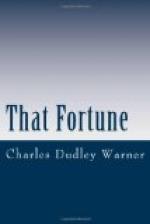Philip was fortunate in that his first novel won him a few friends and a little recognition, but no popularity. It excited neither envy nor hostility. In the perfunctory and somewhat commercial good words it received, he recognized the good-nature of the world. In the few short reviews that dealt seriously with his work, he was able, when the excitement of seeing himself discussed had subsided, to read between the lines why The Puritan Nun had failed to make a larger appeal. It was idyllic and poetic, but it lacked virility; it lacked also simplicity in dealing with the simple and profound facts of life. He had been too solicitous to express himself, to write beautifully, instead of letting the human emotions with which he had to deal show themselves. One notice had said that it was too “literary”; by which, of course, the critic meant that he did not follow the solid traditions, the essential elements in all the great masterpieces of literature that have been created. And yet he had shown a quality, a facility, a promise, that had gained him a foothold and a support in the world of books and of the making of books. And though he had declined Mr. Ault’s tempting offer to illuminate his transcontinental road with a literary torch, he none the less was pleased with this recognition of his capacity and the value of his name.
To say that Philip lived on hope during this summer of heat, suspensions, and business derangement would be to allow him a too substantial subsistence. Evelyn, indeed, seemed, at the distance of Newport, more unattainable than ever, and the scant news he had of the drama enacted there was a perpetual notice to him of the social gulf that lay between them. And yet his dream was sustained by occasional assurances from Miss McDonald of her confidence in Evelyn’s belief in him, nay, of her trust, and she even went so far as to say affection. So he went on building castles in the air, which melted and were renewed day after day, like the transient but unfailing splendor of the sunset.
There was a certain exaltation in this indulgence of his passion that stimulated his creative faculties, and, while his daily tasks kept him from being morbid, his imagination was free to play with the construction of a new story, to which his recent experience would give a certain solidity and a knowledge of the human struggle as it is.
He found himself observing character more closely than before, looking for it not so much in books as in the people he met. There was Murad Ault, for instance. How he would like to put him into a book! Of course it would not do to copy a model, raw, like’ that, but he fell to studying his traits, trying to see the common humanity exhibited in him. Was he a type or was he a freak? This was, however, too dangerous ground until he knew more of life.




